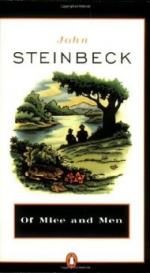|
This section contains 7,883 words (approx. 27 pages at 300 words per page) |

|
Of Mice and Men: Book v. Film
Summary: This essay compares the film and book versions of John Steinbeck's classic story Of Mice and Men. It shows how film director Gary Sinise modifies the book for his film without losing the essence and meaning of the original story. It includes a discussion of the music, lighting, costumes and casting for the film.
Of Mice and Men by Nobel Prize winner, John Steinbeck, is a globally famous novel, capturing its audience by encompassing universal themes that are truthfully realistic in depicting human existence. The director, Gary Sinise, modified the text to accommodate the cinema without losing the essence and meaning of the novel. Thus, Sinise utilized the basic elements of film, such as cinematography, lighting, costumes, plot, sound, acting, and casting, to ensure the themes, relationships, plot and overall message was centralised.
The novel is renowned for its pragmatic message of life itself. If excretes realism in the way it characterises life as a constant strain in which one must contend with numerous obstacles, like the protagonists, George and Lennie. The book identifies how men cling to the false hope of impossible dreams in as a source of comfort amidst their adversities, yet Steinbeck reminds the responder of the certain ramification...
|
This section contains 7,883 words (approx. 27 pages at 300 words per page) |

|


